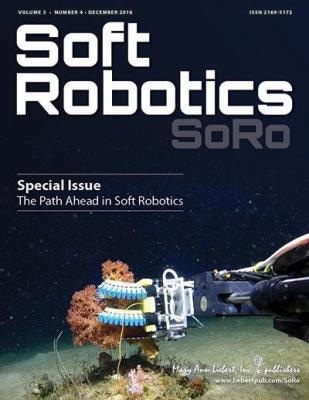Jan 24 2017
Simulation is a valuable tool to improve the energy efficiency of machines and it is now being used to analyze and optimize soft robotic systems to increase their utility, as described in an article published in Soft Robotics, a peer-reviewed journal from Mary Ann Liebert, Inc., publishers. The article is available free on the Soft Robotics website until February 20, 2017.
 (Credit: Mary Ann Liebert, Inc., publishers)
(Credit: Mary Ann Liebert, Inc., publishers)
In the article entitled "Controlling and Simulating Soft Robotic Systems: Insights from a Thermodynamic Perspective," Dylan Ross, Markus Nemitz, and Adam Stokes, The University of Edinburgh, U.K., present a predictive approach for characterizing and improving the design and engineering of soft robotic systems. Their energy-based approach relies on a framework that uses port-based modeling and integrates bond-graphs and port-Hamiltonian theory, which are valuable tools for analyzing the thermodynamics that underlie hybrid, multi-domain soft robotic systems.
"Very few researchers have approached robotics from a broad thermodynamics approach. This paper highlights some of the issues (and opportunities) that are particularly important for soft robots. It really illustrates how researchers in the field are finding new and important ways to think about machine design and performance,” says Editor-in-Chief Barry A. Trimmer, PhD, who directs the Neuromechanics and Biomimetic Devices Laboratory at Tufts University (Medford, MA). “We know there is a lot more to do before soft robots are commonplace, but this paper is certainly leading the way."